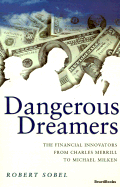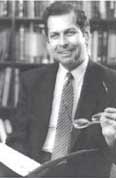|
|
|
|
||||||

|
Dangerous Dreamers: The Financial Innovators from Charles
Merrill to Michael Milken
By Robert Sobel 2001/09 - Beard Books 1587980290 - Paperback - Reprint - 260 pp. US$34.95 Dangerous Dreamers deflates many of the myths surrounding our most controversial innovators and spells out the lessons their stories hold for American business. Publisher Comments In this fast-paced account, Robert Sobel analyzes the causes of the "Junk Decade" against a backdrop of incisive portraits of the perpetrators of some of the most dizzying and daring financial machinations the world has ever seen. Dangerous Dreamers is the story of clever scoundrels and brilliant innovators, such as Ivan Boesky and Michael Milken. It is also the story of the big banks, the pension and mutual funds, the insurance companies, and the S & Ls, who had a critical role in this period of financial instability. From Kirkus Reviews: Informative--if often apologetic and even fawning--attempt by Sobel to put into ``historical perspective'' the Wall Street shenanigans of Michael Milken. As Sobel sees it, Milken is one of a noble line of post-WW II rugged individualists who fashioned new financial instruments and methods to make themselves and others rich. Precursors include Louis Wolfson--like Milken, "shy and assertive, loyal and patriotic," and a Jewish outsider--who was the first to buy up the stock of technically "undervalued" companies, break up the companies, and sell off the pieces at huge profits: In 1967, he was convicted of stock manipulation. Another predecessor, James Ling, a high-school dropout from Oklahoma, devised new ways to raid a corporate treasury to finance hostile takeovers and was able to form early conglomerates in the 1960's, notably LTV. More respectably, Charles Merrill, head of Merrill Lynch in the 1950's, established the first nationwide network of stockbrokers and bond traders--those who later would sell billions of dollars' worth of Milken's high-yield, low-quality corporate junk bonds to S&Ls, insurers, and an unsuspecting public, and who would provide fuel for raiders such as T. Boone Pickens to finance hostile, leveraged takeovers of a size and scope previously unimaginable. As Sobel delineates these deals--which ultimately brought ruin to thousands of S&L depositors, insurance-annuity holders, and employees of dismantled companies--his technical analysis is crystalline, but his sympathies are obviously with Milken, who, he says, has "a social vision." In fact, Sobel builds a not-so-sly and certainly unconvincing case that Milken's prosecution and 40-month sentence were the result of anti-Semitism, even ``demonism'' (Milken's lawyer's term). Sobel hopes that Milken will enjoy a "second act." Many may disagree, but the facts of high finance in the 1980's remain fascinating, even in the author's less-than-neutral hands. -- Copyright ©1993, Kirkus Associates, LP. All rights reserved. From H. Mayo - Choice Louis Wolfson and Jimmy Ling in the 1960s and '70s did the same things that Milken did in the 1980s and experienced the same end. Sobel acknowledges that greed, desire for power, and lack of ethics played a role, but these traits were not limited to the financial innovators. Highly recommended for any library serving programs in finance and business history. From Judith H. Dobrzynski - The New York Times Book Review {Robert Sobel is} a professor of business history at Hofstra University and the author of many books on business. . . . Although the book is billed as a history of financial innovators, the focus is on Mr. Milken, and others are brought in to put him in perspective. . . . Mr. Milken gets off lightly. As Mr. Sobel recites his background, his maniacal work habits, his intellectual breakthroughs, he seems fond of the junk bond maven. . . . Mr. Sobel has written an evenhanded recap of an era. But that's its weakness: 'Dangerous Dreamers'is rather a bland synthesis of other people's reporting and research. Readers get context, not revelation. From Library Journal Sobel, an author of several books on Wall Street, here chronicles the tales of four financial innovators who all pioneered some financial wrinkle: Louis Wolfson, in corporate takeovers; Charles Merrill, in ``people's capitalism'' (stock ownership); and James Ling, in conglomerates. As Sobel sees it, these three were precursors of Michael Milken, who masterminded the junk (high yield/risk) bonds. Once considered one of the nation's most influential businessmen, Milken has stirred strong feelings among both admirers and critics. Sobel here challenges most of what are perceived as Milken's sins, pointing out the importance of his role in financing companies that could not have otherwise obtained funds (MCI, CNN, etc.). Sobel calls Milken's prosecution a prolonged witch hunt that in effect made him the scapegoat for various unpleasant financial excesses of the Eighties. Most libraries will want this informative and entertaining work.-- Alex Wenner, Indiana Univ. Libs., Bloomington From Publisher's Weekly Although Sobel ( The Big Board ) records such ``innovations'' as the Merrill Lynch small-investors-in-volume sales approach, Louis Wolfson's ``conglomerate'' pioneering and the corporate raidings of Boone Pickens, Sobel's liveliest concern here is the controversial ``junk-bond'' market of the 1980s and its star performer, Michael Milken. In a notably balanced chronicle, Sobel weighs government pressure (e.g., Milken was U.S. Attorney Rudolph Guiliani's ``ultimate target'') in the demise of Drexel Burnham Lambert against the junk-bond deregulation connection in the S & L debacles. Sobel also points to Milken's deft facilitation through pooled financing of still-flourishing business start-ups, and he implicitly questions the so-called ``Fatico hearings'' which allow a sentencing judge, as in Milken's case, to admit the presentation of evidence without an indictment. (May)  Robert
Sobel was born in 1931 and died in 1999. He was a prolific historian of
American business life, writing or editing more than 50 books and hundreds
of articles and corporate profiles. He was a professor of business at
Hofstra University for 43 years and held a Ph.D. from New York University.
Besides producing books, articles, book reviews, scripts for television
and audiotapes, he was a weekly columnist for Newsday from 1972 to 1988.
At the time of his death he was a contributing editor to Barron's
Magazine. Robert
Sobel was born in 1931 and died in 1999. He was a prolific historian of
American business life, writing or editing more than 50 books and hundreds
of articles and corporate profiles. He was a professor of business at
Hofstra University for 43 years and held a Ph.D. from New York University.
Besides producing books, articles, book reviews, scripts for television
and audiotapes, he was a weekly columnist for Newsday from 1972 to 1988.
At the time of his death he was a contributing editor to Barron's
Magazine.
|
|
|
|
home
| about us
| contact us
| related
sites |